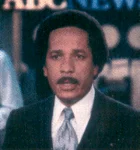Real Celebrities Never Die!
OR
Search For Past Celebrities Whose Birthday You Share

source:wikimedia.org
Max Robinson
Birthday:
01 May, 1939
Date of Death:
20 Dec, 1988
Cause of death:
Complications from AIDS
Nationality:
American
Famous As:
Television journalist
Age at the time of death:
49
Max Robinson's Quote's
Early Life: A Fire Ignited
Max Robinson was a trailblazer, a voice that shattered barriers, and a journalist who believed in the power of truth. As the first African-American network news anchor in the United States, he not only delivered the news—he changed the face of it. From the anchor desk of ABC World News Tonight to his tireless advocacy for racial equality, Robinson’s legacy is one of courage, resilience, and an unrelenting commitment to justice.
Born in Richmond, Virginia, in 1939, Max Robinson grew up in the segregated South, a world where opportunities for Black Americans were often stifled before they could begin. His father, a teacher, instilled in him the value of education and discipline, while his mother nurtured his boundless curiosity. Even as a child, Robinson possessed a commanding presence—his voice, deep and authoritative, hinted at the career that lay ahead.
His first brush with breaking racial barriers came at an early age. In 1959, while attending Virginia Union University, he competed for a newsreader position at a local television station. There was one problem: the station had never hired a Black on-air personality. Robinson, undeterred, auditioned behind a screen. His voice was powerful, his delivery flawless. He got the job—only to be fired the very next day when station executives discovered he was Black. This moment, humiliating as it was, only strengthened his resolve.
Education and Early Career: Finding His Voice
Determined to carve out a place in an industry that wasn’t ready for him, Robinson pursued journalism with an unshakable drive. He attended Oberlin College, Indiana University, and Virginia Union University, sharpening his skills and preparing himself for the battles ahead. His breakthrough came when he landed a position at WTOV-TV in Portsmouth, Virginia, becoming one of the first Black television journalists in the country.
From there, he moved to Washington, D.C., where he joined WTOP-TV (now WUSA-TV). It was here that Robinson truly found his voice. He wasn’t content with simply reporting the news—he wanted to tell the stories that mattered, the ones too often overlooked. His investigative reports on racial disparities, urban struggles, and social justice issues set him apart, earning him both respect and controversy. He knew the risks, but he also knew the power of representation.
Breaking Barriers at ABC News
In 1978, Robinson made history. ABC News tapped him to co-anchor World News Tonight, making him the first African-American to hold such a position at a major network. It was a monumental achievement, but it came with immense pressure. Behind the scenes, he faced racism, both overt and insidious. Some viewers refused to accept a Black man delivering the news, and tensions within the newsroom often ran high.
Despite these challenges, Robinson remained steadfast. His reporting was incisive, his presence commanding. He covered major national and international events, offering a perspective that had long been missing from mainstream media. Yet, the weight of breaking barriers took its toll. He often spoke of the loneliness of his position, the burden of being a pioneer in an industry slow to change.
Personal Life
Robinson was married three times. Two ended in divorce, one in annulment.His first marriage was to Eleanor Booker from 1963 to 1968 and they had three children: Mark, Maureen, and Michael. His second marriage was to Hazel O’Leary from 1974 to 1975. Robinson’s final marriage was to Beverly Hamilton from 1977 to 1986, with whom he had another son, Malik.
Personal Struggles and Advocacy
Beyond the newsroom, Robinson was a fierce advocate for Black journalists. He co-founded the National Association of Black Journalists (NABJ), an organization dedicated to increasing diversity in newsrooms and ensuring that Black voices were heard. He mentored young journalists, urging them to push boundaries and demand a seat at the table.
However, his personal struggles were mounting. The pressures of his career, combined with internal battles, led him down a path of self-destruction. He battled alcoholism and health issues, retreating from the public eye as the years went on. In 1988, at just 49 years old, Robinson passed away due to complications related to AIDS. His death was a tragic loss, but his impact was undeniable.
Legacy: A Voice That Echoes
Max Robinson’s legacy is one of perseverance and change. He paved the way for future generations of Black journalists, proving that representation in media isn’t just important—it’s necessary. Today, his contributions are remembered not just in history books, but in the voices of every journalist of color who stands before a camera, knowing that their presence is powerful.
His story is a reminder that progress is often hard-won, that pioneers bear burdens unseen by many, and that the fight for equality in media is far from over. But because of Max Robinson, the door is open. And through that door, a new generation continues to walk.
Name:
Max Robinson
Popular Name:
Max Robinson
Gender:
Male
Cause of Death:
Complications from AIDS
Spouse:
Place of Birth:
Richmond, Virginia, U.S.
Place of Death:
Washington, D.C., U.S.
Occupation / Profession:
Personality Type
Defender: Very dedicated and warm protectors, always ready to defend their loved ones. As the first African-American broadcast journalist, he felt a sense of responsibility towards his community that he took seriously.
He became the first African-American anchor on a major network news program.
His reporting focused on civil rights, social justice, and inequality issues.
Robinson co-anchored ABC's World News Tonight from 1978 to 1983.
Max Robinson was the first African–American broadcast news anchor
